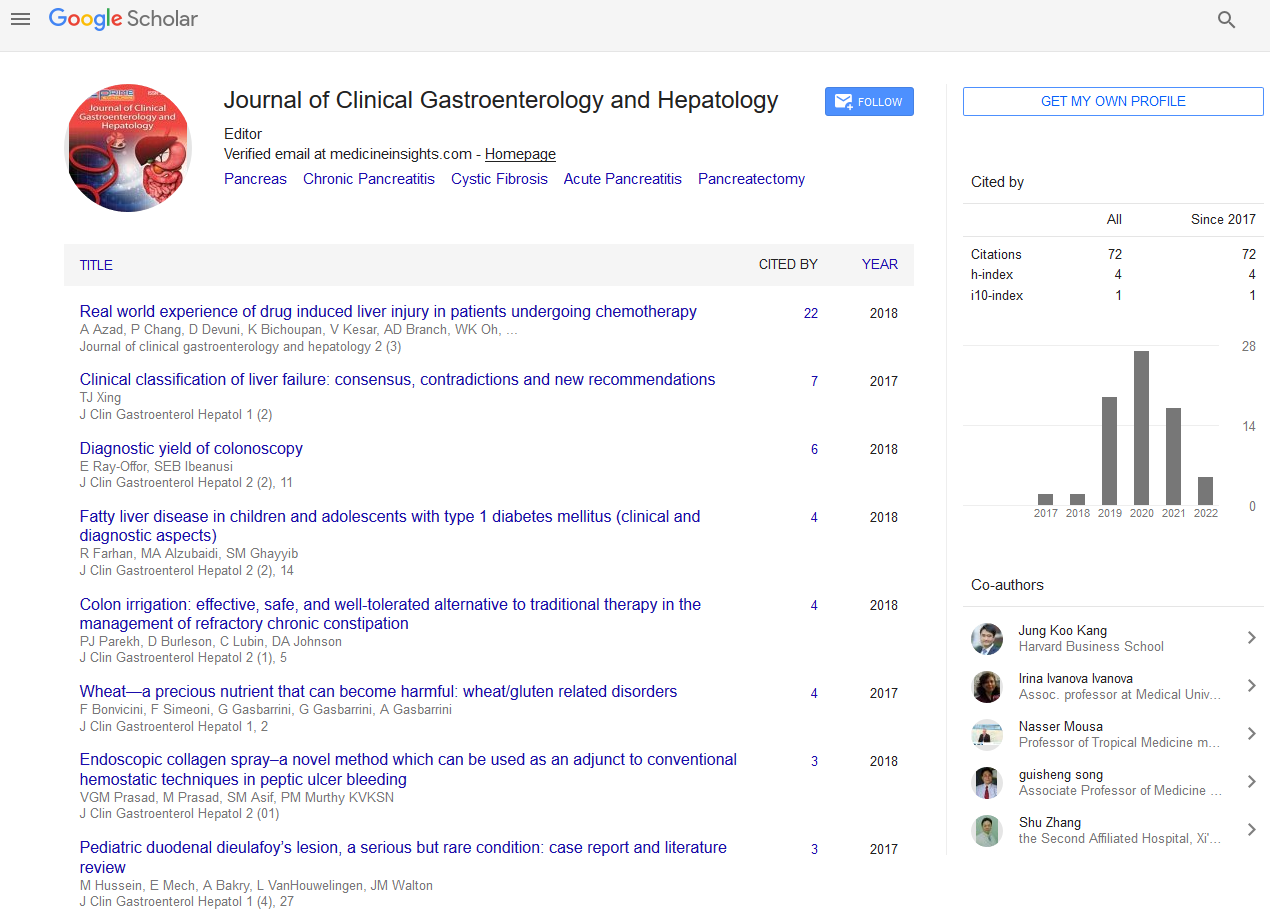Commentary - (2025) Volume 9, Issue 1
Appendicitis is a Common Yet Potentially Serious Medical Condition That Occurs When the Appendix Becomes Inflamed
Angelo Restivo*
Department of Medical and Surgical Sciences, University of Bologna, Bologna, Italy
*Correspondence:
Angelo Restivo, Department of Medical and Surgical Sciences, University of Bologna, Bologna,
Italy,
Email:
Received: 16-Aug-2023, Manuscript No. IPJCGH-23-17337;
Editor assigned: 18-Aug-2023, Pre QC No. IPJCGH-23-17337 (PQ);
Reviewed: 01-Sep-2023, QC No. IPJCGH-23-17337;
Revised: 04-Jan-2025, Manuscript No. IPJCGH-23-17337 (R);
Published:
11-Jan-2025, DOI: 10.36648/2575-7733.9.1.57
Description
Appendicitis is a condition that requires prompt attention and medical intervention. Recognizing the symptoms and seeking medical help early on can prevent complications and ensure a smoother recovery. If you or someone you know experiences symptoms of appendicitis, such as severe abdominal pain, loss of appetite, and nausea, it's important to consult a healthcare professional immediately. With timely diagnosis and appropriate treatment, individuals can effectively overcome this common ailment and resume a healthy, normal life. Prompt treatment is essential to prevent the appendix from rupturing, which can lead to a life-threatening condition called peritonitis. The main treatment for appendicitis is surgery, typically performed using a minimally invasive procedure known as laparoscopic appendectomy. During this procedure, the inflamed appendix is removed through small incisions, leading to a shorter recovery time and reduced scarring compared to traditional open surgery. In some cases, if the appendix has already ruptured and formed an abscess, drainage might be required before the appendix is removed. Antibiotics are also administered to manage the infection. Appendicitis is a common yet potentially serious medical condition that occurs when the appendix becomes inflamed. The appendix is a small, finger-like pouch of tissue that extends from the large intestine. While it’s exact function remains a subject of debate, its inflammation can lead to significant health issues if not promptly addressed. In this article, we will delve into the causes, symptoms, diagnosis, and treatment options for appendicitis. Appendicitis usually occurs due to a blockage in the opening of the appendix, resulting in bacterial overgrowth and inflammation. The blockage can be attributed to factors such as fecal matter, enlarged lymphoid follicles, or even tumors. As the bacteria multiply and the appendix swells, it becomes prone to infection, leading to more severe complications. Recognizing the symptoms of appendicitis is crucial for early intervention.
Common signs include:
Abdominal pain: The most characteristic symptom is abdominal pain, typically starting around the navel and gradually moving to the lower right side of the abdomen. The pain often intensifies and becomes more localized over a few hours.
Loss of appetite: Appendicitis can lead to a sudden loss of appetite due to the inflammation and discomfort in the abdominal region.
Nausea and vomiting: Individuals with appendicitis may experience nausea and vomiting, often accompanied by a feeling of general malaise.
Fever: A low-grade fever might develop as the body tries to fight off the infection.
Change in bowel habits: Some people may experience changes in their bowel habits, including diarrhea or constipation.
Diagnosing appendicitis involves a combination of clinical evaluation, physical examination, and diagnostic tests. Doctors often perform tests such as: Physical examination for tenderness and inflammation in the lower right quadrant of the abdomen, known as McBurney's point, to assess the likelihood of appendicitis. Blood tests elevated white blood cell counts and other markers of infection can indicate the presence of appendicitis. Imaging Tests imaging techniques like ultrasound and CT scans can help visualize the appendix and surrounding structures, aiding in confirming the diagnosis. Appendicitis is a medical condition that involves the inflammation of the appendix, a small, finger-like pouch located at the junction of the small and large intestines.
Citation: Restivo A (2025) Appendicitis is a Common yet Potentially Serious Medical Condition that occurs when the Appendix
becomes Inflamed. J Clin Gastroenterol Hepatol. 9:57.
Copyright: © 2025 Restivo A. This is an open-access article distributed under the terms of the Creative Commons Attribution
License, which permits unrestricted use, distribution, and reproduction in any medium, provided the original author and source
are credited.

